Lancia Musa 2009 Owner handbook (in English)
Manufacturer: LANCIA, Model Year: 2009, Model line: Musa, Model: Lancia Musa 2009Pages: 218, PDF Size: 3.7 MB
Page 161 of 218
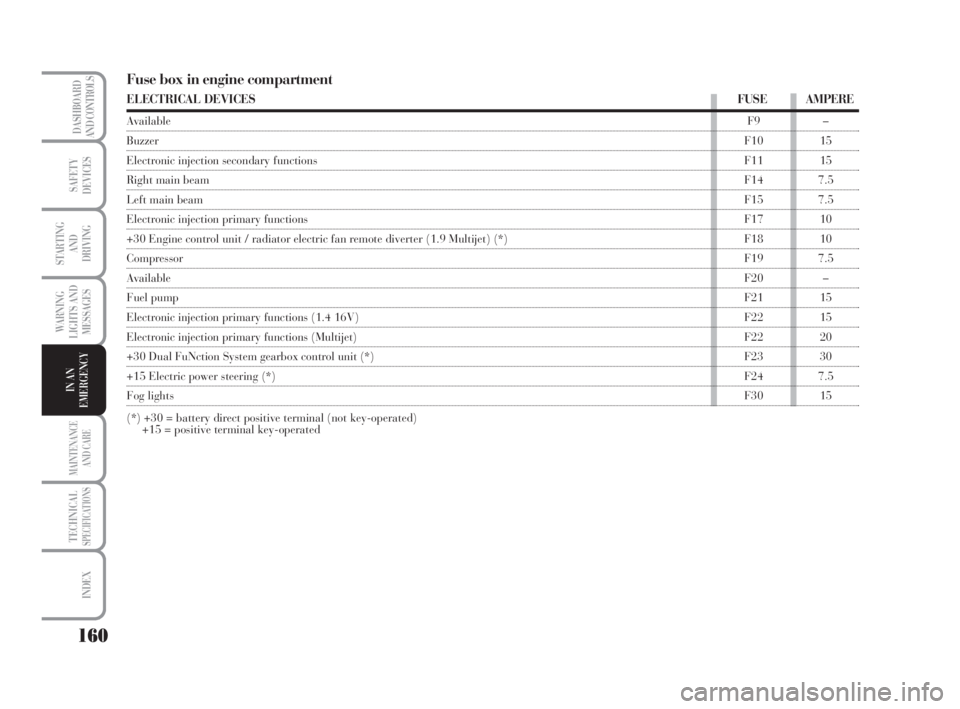
160
WARNING
LIGHTS AND
MESSAGES
MAINTENANCE
AND CARE
TECHNICALSPECIFICATIONS
INDEX
DASHBOARD
AND CONTROLS
SAFETY
DEVICES
STARTING
AND
DRIVING
IN AN
EMERGENCY
Fuse box in engine compartment
ELECTRICAL DEVICESFUSEAMPERE
AvailableF9 –
BuzzerF10 15
Electronic injection secondary functionsF11 15
Right main beam F14 7.5
Left main beam F15 7.5
Electronic injection primary functionsF17 10
+30 Engine control unit / radiator electric fan remote diverter (1.9 Multijet) (*) F18 10
CompressorF19 7.5
AvailableF20 –
Fuel pump F21 15
Electronic injection primary functions (1.4 16V)F22 15
Electronic injection primary functions (Multijet)F22 20
+30 Dual FuNction System gearbox control unit (*)F23 30
+15 Electric power steering (*)F24 7.5
Fog lightsF30 15
(*) +30 = battery direct positive terminal (not key-operated)
+15 = positive terminal key-operated
135-164 MUSA 1ed GB 10-07-2008 9:38 Pagina 160
Page 162 of 218
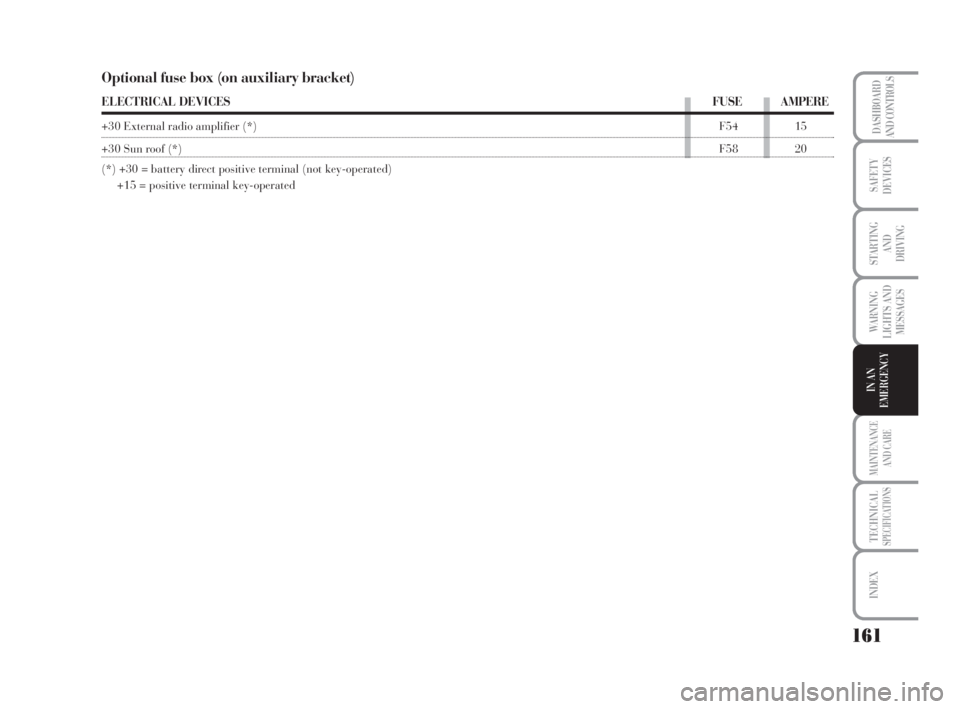
161
WARNING
LIGHTS AND
MESSAGES
MAINTENANCE
AND CARE
TECHNICALSPECIFICATIONS
INDEX
DASHBOARD
AND CONTROLS
SAFETY
DEVICES
STARTING
AND
DRIVING
IN AN
EMERGENCY
Optional fuse box (on auxiliary bracket)
ELECTRICAL DEVICESFUSE AMPERE
+30 External radio amplifier (*)F54 15
+30 Sun roof (*)F58 20
(*) +30 = battery direct positive terminal (not key-operated)
+15 = positive terminal key-operated
135-164 MUSA 1ed GB 10-07-2008 9:38 Pagina 161
Page 163 of 218
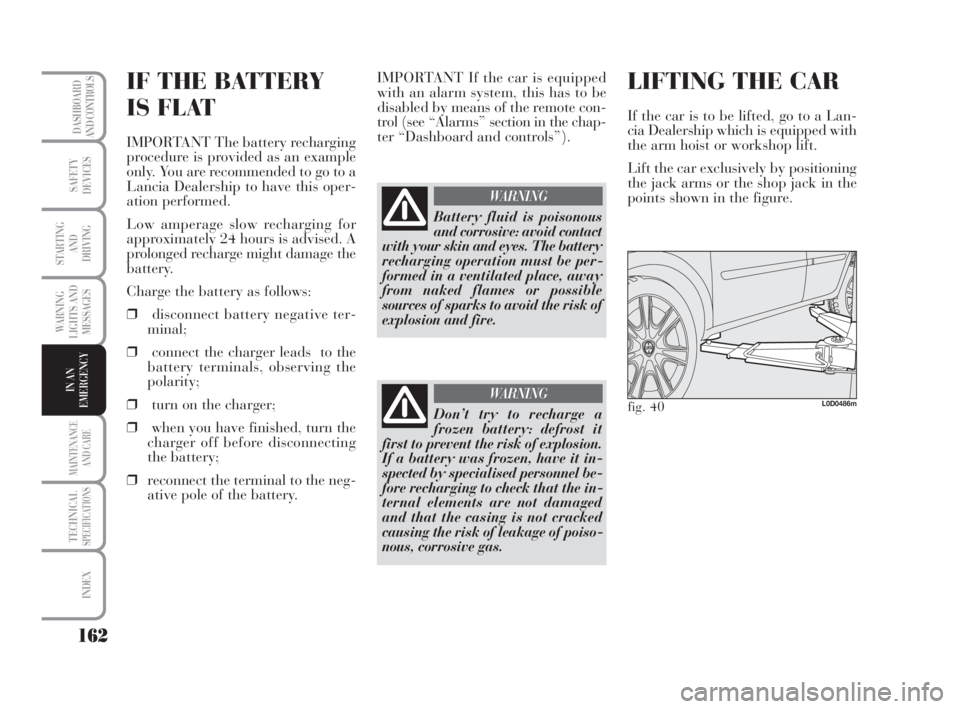
162
WARNING
LIGHTS AND
MESSAGES
MAINTENANCE
AND CARE
TECHNICALSPECIFICATIONS
INDEX
DASHBOARD
AND CONTROLS
SAFETY
DEVICES
STARTING
AND
DRIVING
IN AN
EMERGENCY
IF THE BATTERY
IS FLAT
IMPORTANT The battery recharging
procedure is provided as an example
only. You are recommended to go to a
Lancia Dealership to have this oper-
ation performed.
Low amperage slow recharging for
approximately 24 hours is advised. A
prolonged recharge might damage the
battery.
Charge the battery as follows:
❒disconnect battery negative ter-
minal;
❒connect the charger leads to the
battery terminals, observing the
polarity;
❒turn on the charger;
❒when you have finished, turn the
charger off before disconnecting
the battery;
❒reconnect the terminal to the neg-
ative pole of the battery.IMPORTANT If the car is equipped
with an alarm system, this has to be
disabled by means of the remote con-
trol (see “Alarms” section in the chap-
ter “Dashboard and controls”).
LIFTING THE CAR
If the car is to be lifted, go to a Lan-
cia Dealership which is equipped with
the arm hoist or workshop lift.
Lift the car exclusively by positioning
the jack arms or the shop jack in the
points shown in the figure.
Battery fluid is poisonous
and corrosive: avoid contact
with your skin and eyes. The battery
recharging operation must be per-
formed in a ventilated place, away
from naked flames or possible
sources of sparks to avoid the risk of
explosion and fire.
WARNING
Don’t try to recharge a
frozen battery: defrost it
first to prevent the risk of explosion.
If a battery was frozen, have it in-
spected by specialised personnel be-
fore recharging to check that the in-
ternal elements are not damaged
and that the casing is not cracked
causing the risk of leakage of poiso-
nous, corrosive gas.
WARNINGfig. 40L0D0486m
135-164 MUSA 1ed GB 10-07-2008 9:38 Pagina 162
Page 164 of 218
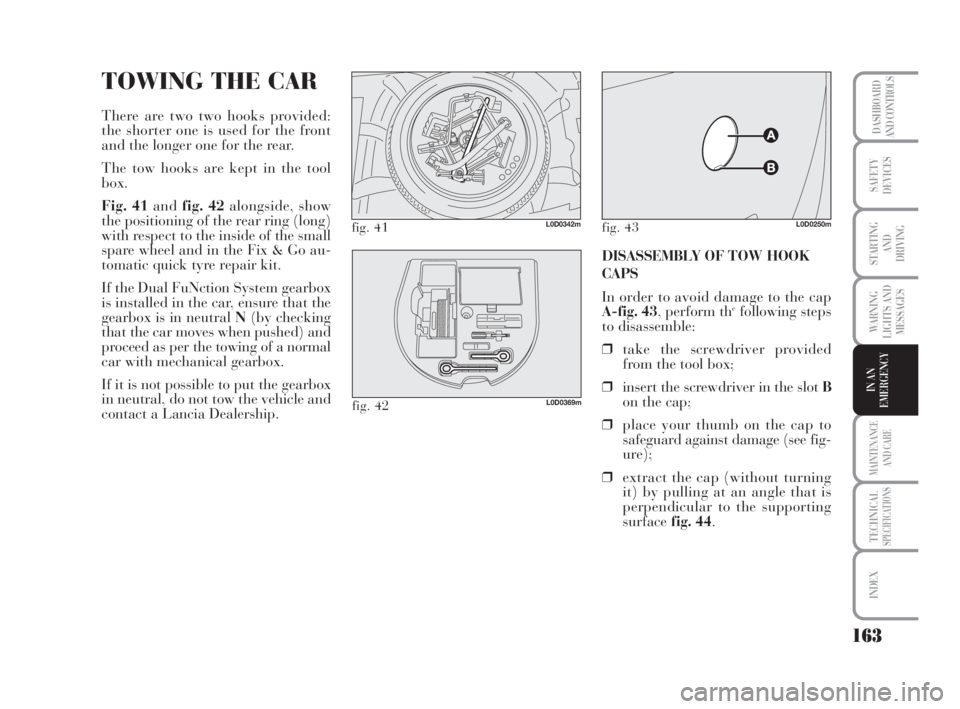
163
WARNING
LIGHTS AND
MESSAGES
MAINTENANCE
AND CARE
TECHNICALSPECIFICATIONS
INDEX
DASHBOARD
AND CONTROLS
SAFETY
DEVICES
STARTING
AND
DRIVING
IN AN
EMERGENCY
TOWING THE CAR
There are two two hooks provided:
the shorter one is used for the front
and the longer one for the rear.
The tow hooks are kept in the tool
box.
Fig. 41 andfig. 42 alongside, show
the positioning of the rear ring (long)
with respect to the inside of the small
spare wheel and in the Fix & Go au-
tomatic quick tyre repair kit.
If the Dual FuNction System gearbox
is installed in the car, ensure that the
gearbox is in neutral N(by checking
that the car moves when pushed) and
proceed as per the towing of a normal
car with mechanical gearbox.
If it is not possible to put the gearbox
in neutral, do not tow the vehicle and
contact a Lancia Dealership.
fig. 41L0D0342m
fig. 42L0D0369m
DISASSEMBLY OF TOW HOOK
CAPS
In order to avoid damage to the cap
A-fig. 43, perform th
efollowing steps
to disassemble:
❒take the screwdriver provided
from the tool box;
❒insert the screwdriver in the slot B
on the cap;
❒place your thumb on the cap to
safeguard against damage (see fig-
ure);
❒extract the cap (without turning
it) by pulling at an angle that is
perpendicular to the supporting
surfacefig. 44.
fig. 43L0D0250m
135-164 MUSA 1ed GB 10-07-2008 9:38 Pagina 163
Page 165 of 218
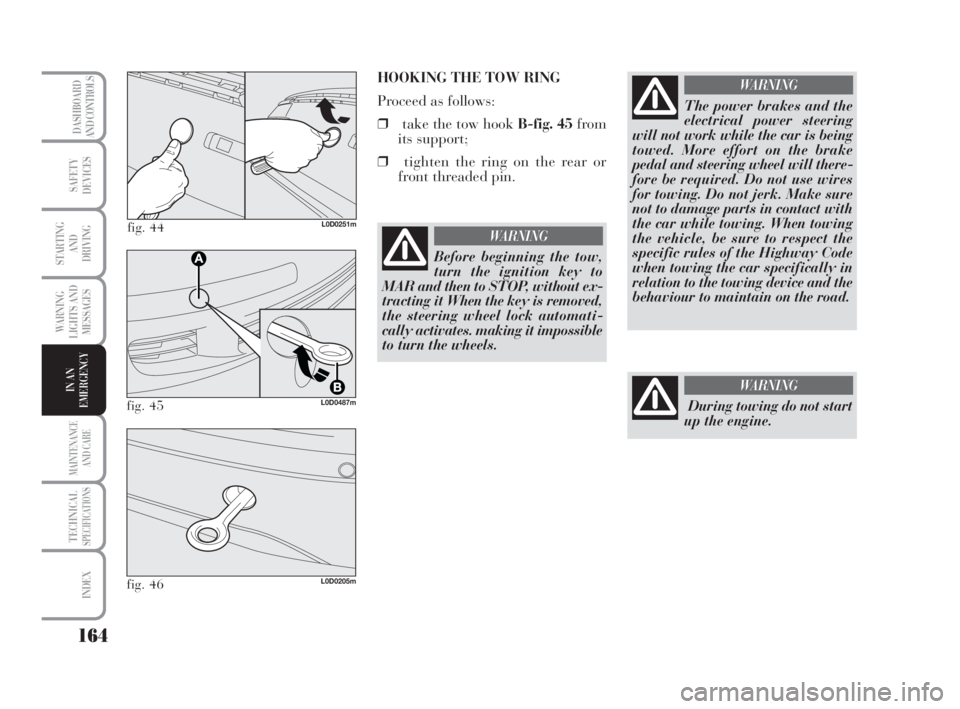
164
WARNING
LIGHTS AND
MESSAGES
MAINTENANCE
AND CARE
TECHNICALSPECIFICATIONS
INDEX
DASHBOARD
AND CONTROLS
SAFETY
DEVICES
STARTING
AND
DRIVING
IN AN
EMERGENCY
fig. 44L0D0251m
HOOKING THE TOW RING
Proceed as follows:
❒take the tow hook B-fig. 45from
its support;
❒tighten the ring on the rear or
front threaded pin.
fig. 45L0D0487m
fig. 46L0D0205m
The power brakes and the
electrical power steering
will not work while the car is being
towed. More effort on the brake
pedal and steering wheel will there-
fore be required. Do not use wires
for towing. Do not jerk. Make sure
not to damage parts in contact with
the car while towing. When towing
the vehicle, be sure to respect the
specific rules of the Highway Code
when towing the car specifically in
relation to the towing device and the
behaviour to maintain on the road.
WARNING
Before beginning the tow,
turn the ignition key to
MAR and then to STOP, without ex-
tracting it When the key is removed,
the steering wheel lock automati-
cally activates. making it impossible
to turn the wheels.
WARNING
During towing do not start
up the engine.
WARNING
135-164 MUSA 1ed GB 10-07-2008 9:38 Pagina 164
Page 166 of 218

165
WARNING
LIGHTS AND
MESSAGES
TECHNICALSPECIFICATIONS
INDEX
DASHBOARD
AND CONTROLS
SAFETY
DEVICES
STARTING
AND
DRIVING
IN AN
EMERGENCY
MAINTENANCE
AND CARE
MAINTENANCE AND CARE
SCHEDULED SERVICING................................ 166
SERVICE SCHEDULE ..................................... 167
ANNUAL INSPECTION SCHEDULE................ 169
ADDITIONAL CHECKS.................................... 169
CHECKING FLUID LEVELS............................ 171
DIESEL FILTER (green filter) .......................... 177
BATTERY.......................................................... 177
WHEELS AND TYRES...................................... 179
RUBBER HOSES............................................... 180
WINDSCREEN/REAR WINDOW WIPERS........ 181
BODYWORK..................................................... 182
INTERIORS....................................................... 185
165-186 MUSA 1ed GB 10-07-2008 9:39 Pagina 165
Page 167 of 218
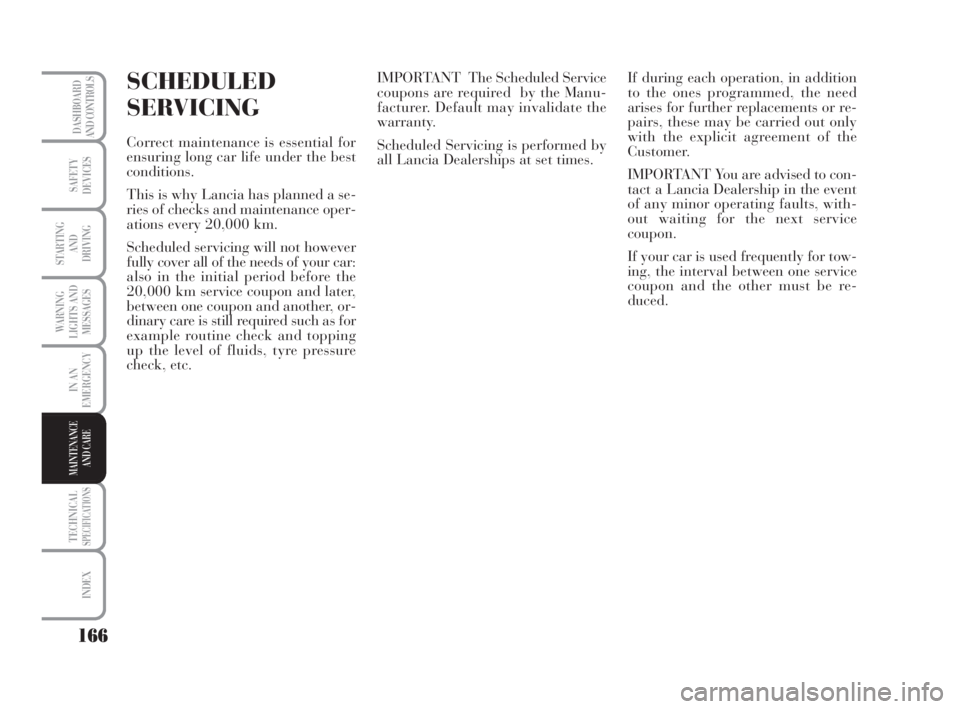
166
WARNING
LIGHTS AND
MESSAGES
TECHNICALSPECIFICATIONS
INDEX
DASHBOARD
AND CONTROLS
SAFETY
DEVICES
STARTING
AND
DRIVING
IN AN
EMERGENCY
MAINTENANCE
AND CARE
SCHEDULED
SERVICING
Correct maintenance is essential for
ensuring long car life under the best
conditions.
This is why Lancia has planned a se-
ries of checks and maintenance oper-
ations every 20,000 km.
Scheduled servicing will not however
fully cover all of the needs of your car:
also in the initial period before the
20,000 km service coupon and later,
between one coupon and another, or-
dinary care is still required such as for
example routine check and topping
up the level of fluids, tyre pressure
check, etc. IMPORTANT The Scheduled Service
coupons are required by the Manu-
facturer. Default may invalidate the
warranty.
Scheduled Servicing is performed by
all Lancia Dealerships at set times. If during each operation, in addition
to the ones programmed, the need
arises for further replacements or re-
pairs, these may be carried out only
with the explicit agreement of the
Customer.
IMPORTANT You are advised to con-
tact a Lancia Dealership in the event
of any minor operating faults, with-
out waiting for the next service
coupon.
If your car is used frequently for tow-
ing, the interval between one service
coupon and the other must be re-
duced.
165-186 MUSA 1ed GB 10-07-2008 9:39 Pagina 166
Page 168 of 218
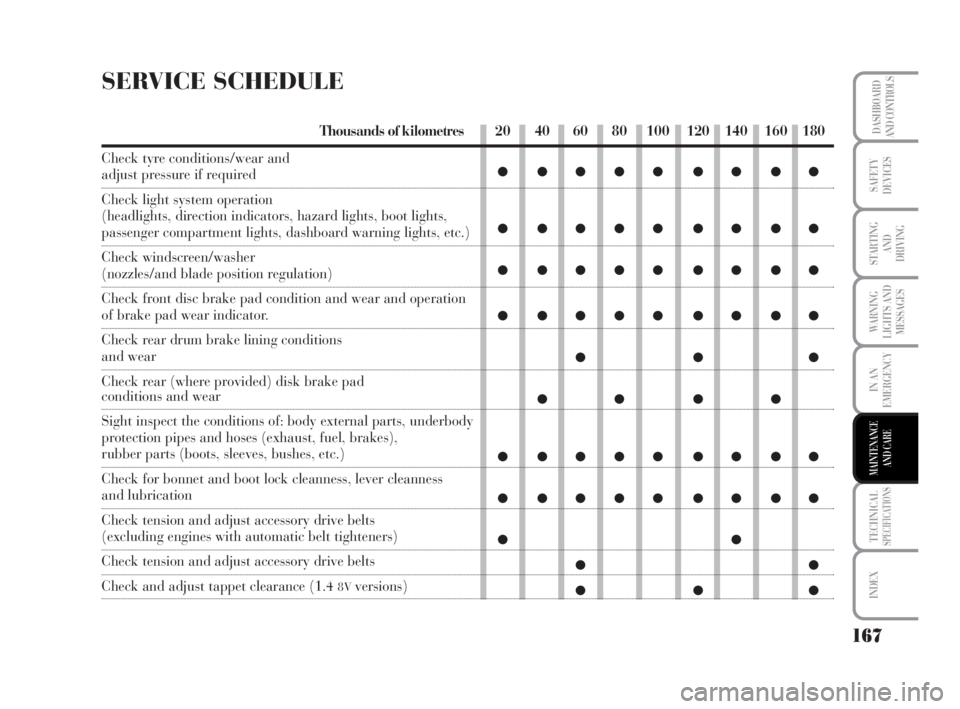
167
WARNING
LIGHTS AND
MESSAGES
TECHNICALSPECIFICATIONS
INDEX
DASHBOARD
AND CONTROLS
SAFETY
DEVICES
STARTING
AND
DRIVING
IN AN
EMERGENCY
MAINTENANCE
AND CARE
SERVICE SCHEDULE
Thousands of kilometres
Check tyre conditions/wear and
adjust pressure if required
Check light system operation
(headlights, direction indicators, hazard lights, boot lights,
passenger compartment lights, dashboard warning lights, etc.)
Check windscreen/washer
(nozzles/and blade position regulation)
Check front disc brake pad condition and wear and operation
of brake pad wear indicator.
Check rear drum brake lining conditions
and wear
Check rear (where provided) disk brake pad
conditions and wear
Sight inspect the conditions of: body external parts, underbody
protection pipes and hoses (exhaust, fuel, brakes),
rubber parts (boots, sleeves, bushes, etc.)
Check for bonnet and boot lock cleanness, lever cleanness
and lubrication
Check tension and adjust accessory drive belts
(excluding engines with automatic belt tighteners)
Check tension and adjust accessory drive belts
Check and adjust tappet clearance (1.4 8Vversions)
20 40 60 80 100 120 140 160 180
●●●●● ●●●●
●●●●● ●●●●
●●●●● ●●●●
●●●●● ●●●●
●●●
●● ● ●
●●●●● ●●●●
●●●●● ●●●●
●●
●●
●●●
165-186 MUSA 1ed GB 10-07-2008 9:39 Pagina 167
Page 169 of 218
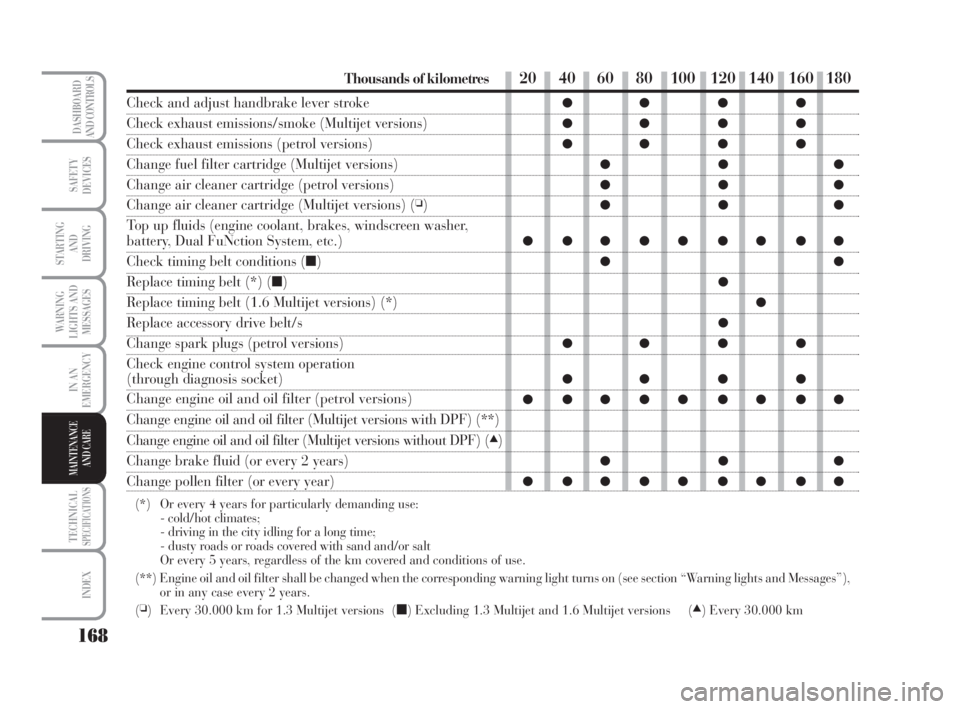
168
WARNING
LIGHTS AND
MESSAGES
TECHNICALSPECIFICATIONS
INDEX
DASHBOARD
AND CONTROLS
SAFETY
DEVICES
STARTING
AND
DRIVING
IN AN
EMERGENCY
MAINTENANCE
AND CARE
Thousands of kilometres
Check and adjust handbrake lever stroke
Check exhaust emissions/smoke (Multijet versions)
Check exhaust emissions (petrol versions)
Change fuel filter cartridge (Multijet versions)
Change air cleaner cartridge (petrol versions)
Change air cleaner cartridge (Multijet versions) (❏)
Top up fluids (engine coolant, brakes, windscreen washer,
battery, Dual FuNction System, etc.)
Check timing belt conditions (■)
Replace timing belt (*) (■)
Replace timing belt (1.6 Multijet versions) (*)
Replace accessory drive belt/s
Change spark plugs (petrol versions)
Check engine control system operation
(through diagnosis socket)
Change engine oil and oil filter (petrol versions)
Change engine oil and oil filter (Multijet versions with DPF) (**)
Change engine oil and oil filter (Multijet versions without DPF) (▲)
Change brake fluid (or every 2 years)
Change pollen filter (or every year)
(*) Or every 4 years for particularly demanding use:
- cold/hot climates;
- driving in the city idling for a long time;
- dusty roads or roads covered with sand and/or salt
Or every 5 years, regardless of the km covered and conditions of use.
(**) Engine oil and oil filter shall be changed when the corresponding warning light turns on (see section “Warning lights and Messages”),
or in any case every 2 years.
(
❏) Every 30.000 km for 1.3 Multijet versions (■) Excluding 1.3 Multijet and 1.6 Multijet versions (▲) Every 30.000 km
20 40 60 80 100 120 140 160 180
●● ● ●
●● ● ●
●● ● ●
●●●
●●●
●●●
●●●●● ●●●●
●●
●
●
●
●● ● ●
●● ● ●
●●●●● ●●●●
●●●
●●●●● ●●●●
165-186 MUSA 1ed GB 10-07-2008 9:39 Pagina 168
Page 170 of 218
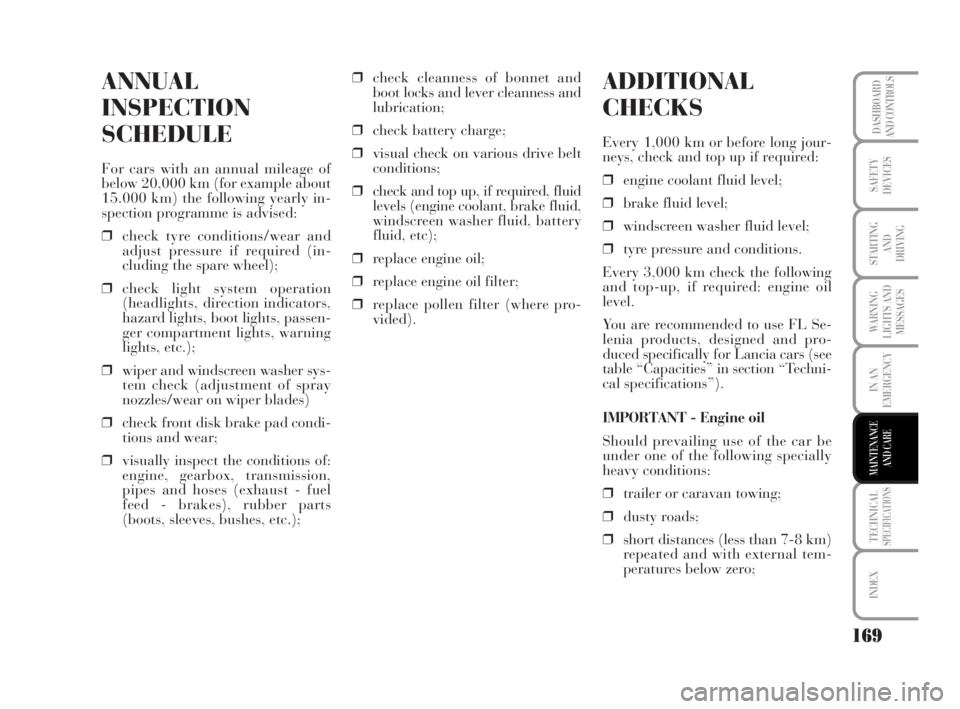
169
WARNING
LIGHTS AND
MESSAGES
TECHNICALSPECIFICATIONS
INDEX
DASHBOARD
AND CONTROLS
SAFETY
DEVICES
STARTING
AND
DRIVING
IN AN
EMERGENCY
MAINTENANCE
AND CARE
ANNUAL
INSPECTION
SCHEDULE
For cars with an annual mileage of
below 20,000 km (for example about
15.000 km) the following yearly in-
spection programme is advised:
❒check tyre conditions/wear and
adjust pressure if required (in-
cluding the spare wheel);
❒check light system operation
(headlights, direction indicators,
hazard lights, boot lights, passen-
ger compartment lights, warning
lights, etc.);
❒wiper and windscreen washer sys-
tem check (adjustment of spray
nozzles/wear on wiper blades)
❒check front disk brake pad condi-
tions and wear;
❒visually inspect the conditions of:
engine, gearbox, transmission,
pipes and hoses (exhaust - fuel
feed - brakes), rubber parts
(boots, sleeves, bushes, etc.);❒check cleanness of bonnet and
boot locks and lever cleanness and
lubrication;
❒check battery charge;
❒visual check on various drive belt
conditions;
❒check and top up, if required, fluid
levels (engine coolant, brake fluid,
windscreen washer fluid, battery
fluid, etc);
❒replace engine oil;
❒replace engine oil filter;
❒replace pollen filter (where pro-
vided).
ADDITIONAL
CHECKS
Every 1,000 km or before long jour-
neys, check and top up if required:
❒engine coolant fluid level;
❒brake fluid level;
❒windscreen washer fluid level;
❒tyre pressure and conditions.
Every 3,000 km check the following
and top-up, if required: engine oil
level.
You are recommended to use FL Se-
lenia products, designed and pro-
duced specifically for Lancia cars (see
table “Capacities” in section “Techni-
cal specifications”).
IMPORTANT - Engine oil
Should prevailing use of the car be
under one of the following specially
heavy conditions:
❒trailer or caravan towing;
❒dusty roads;
❒short distances (less than 7-8 km)
repeated and with external tem-
peratures below zero;
165-186 MUSA 1ed GB 10-07-2008 9:39 Pagina 169